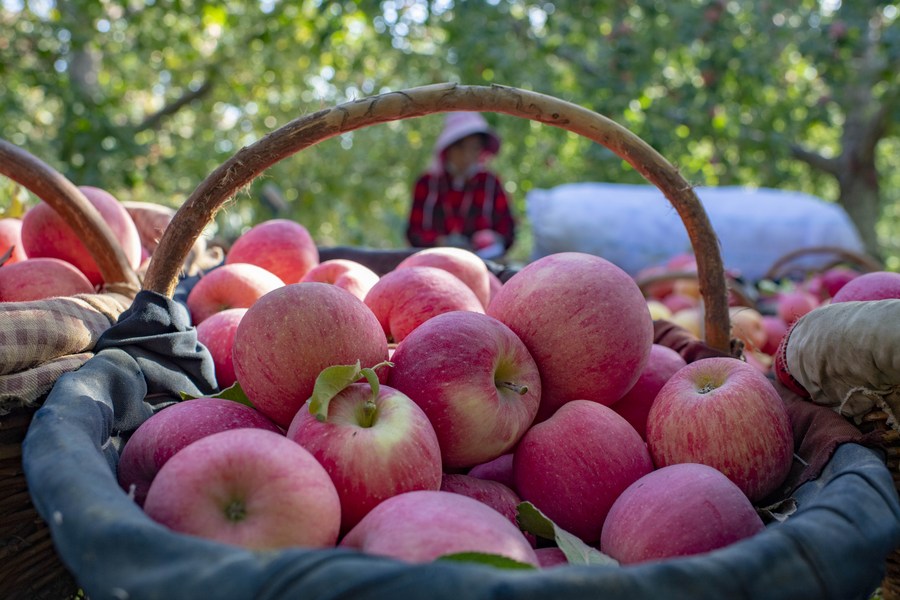Characteristic fruit products of Xinjiang well-received across China as domestic sales boom

A farmer sorts harvested apples at a garden in Aksu of northwest China's Xinjiang Uygur Autonomous Region, Oct. 21, 2020. (Xinhua/Hu Huhu)
“It feels great to see tourists buy the walnuts produced in my hometown every day,” said Wuniqiamu, a saleswoman at the Xinjiang International Grand Bazaar in Urumqi, northwest China’s Xinjiang Uygur autonomous region.
Wuniqiamu used to be a walnut farmer in Moyu county, Hotan prefecture, Xinjiang. She then ventured to the Xinjiang International Grand Bazaar after being hired by the Xinjiang Guoye Company as a salesperson.
“Now I earn a monthly salary of 4,500 yuan ($670.95) on average, and sometimes 6,000 yuan when business is good,” said Wuniqiamu, who has been awarded the honorary title of “Employee of the Year” for her conscientiousness and strong sense of responsibility.
Headquartered in Urumqi, the Xinjiang Guoye Company mainly engages in the processing and sale of agricultural products and food. The fruit bazaar of the Xinjiang International Grand Bazaar, where Wuniqiamu works, is a one-stop platform and brick-and-mortar experience store established by the company for the sale of characteristic products originating from Xinjiang, particularly fresh fruits and dried fruits sourced from both the southern and northern areas of the region.
The fruit bazaar has 13 themed halls for products that include grapes, walnuts, and sea-buckthorn. It is now a must-visit destination enjoying great popularity online.
In recent years, the Xinjiang Guoye Company has built a network for the purchase of products across Xinjiang and another network for the sale of these products outside the region.
“Focusing on the industrialization of characteristic fruits in Xinjiang, we try to better connect the producing areas with the market and do a good job in the construction of the two networks for the purchase and sale of agricultural products, so as to benefit the agricultural sector, rural areas, and rural people and increase the income of farmers,” said Yang Yongxiang, executive director of a subsidiary of Xinjiang Guoye Company.
The Xinjiang Guoye Company has set up 17 centers for warehousing, processing, trading, and centralized distribution in major fruit producing areas in Xinjiang, including the Aksu prefecture, Hotan prefecture, and Kashgar prefecture.
The company has also introduced and built more than 70 processing lines and vigorously applied and promoted the commercialization of sci-tech achievements in various links of the industrial chain, such as storage and preservation, fruit processing, quality control, and supply chain management. It has directly and indirectly helped more than 2 million rural people increase their incomes.
Through cooperation with well-known third-party platforms in various regions, the Xinjiang Guoye Company has built a large trading center for Xinjiang’s agricultural products and cultivated brands of agricultural products represented by West Orchard.
Today, the company runs stores and sales outlets for freshly-picked agricultural products from Xinjiang in various cities across China, such as Guangzhou, Chengdu, and Wuhan. Last year, the revenue of the company reached 9.6 billion yuan.
The Xinjiang Guoye Company has also released spot price indexes for red dates, walnuts, and raisins, promoting the sharing of information about the market, product standards, logistics services, trading channels, and financial services between Xinjiang and other regions and between online and offline platforms throughout China, thus further boosting the popularity and sales of Xinjiang’s agricultural products at home and abroad.
As of the end of 2020, Xinjiang’s annual fruit output and output value had reached nearly 8.46 million tons and about 52.29 billion yuan, respectively. Meanwhile, fruit farmers in the region saw their per capita net income from fruit production exceed 6,100 yuan, accounting for 44.7 percent of their total income. In some major fruit producing counties in the region, such as Ruoqiang county and Wensu county, the proportion has even surpassed 70 percent.
Photos
Related Stories
- Spectacular views of horses frolicking in the river waters in NW China’s Xinjiang
- Diwopu railway station in Xinjiang put into operation
- View of Narat scenic spot in NW China's Xinjiang
- Xinjiang craftsman keeps traditional earthenware craft of Uygur ethnicity alive
- Feature: Sports bring people of various ethnic groups together in Xinjiang
- Rail freight in China's Xinjiang surpasses 100 mln tonnes in 2022
- U.S. will only detach itself from global industrial chain by banning Xinjiang products: commentary
- Xinjiang farmers indignant about being labeled by U.S. lies
- China's Xinjiang condemns U.S. "forced labor" act
- Lavender planting promotes local tourism in Sigong Village, Xinjiang
Copyright © 2022 People's Daily Online. All Rights Reserved.









